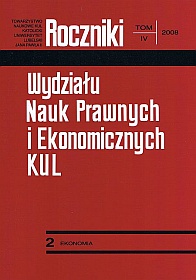On Friedrich August von Hayek’s Economic Neo-Liberalism
Abstract
Friedrich August von Hayek, the winner of the Nobel Memorial Prize in Economics, is one of the most important representatives of economic and social neo-liberalism, who, despite basing his economic theory on Darwin’s Theory of Evolution and on basic principles of the prime liberalism, sees the necessity of distance himself from its shape. Von Hayek postulates raising the status of the family and of tradition as the foundations of cultural progress, of moral norms in ethics, without which human activity in general would be, in his opinion, out of the question. He also proclaims himself in favor of accepting the universal legal norms worked out in the Roman law and perceives the very essence and foundation for the human culture in the Christian religion. Although his neo-liberalism considerably enriches the ideas of classical liberalism, this direction in the thought requires a further development, in order to achieve a complete economic culture that as its aim has the common good, in which both the good of God Himself is inscribed as if the ultimate reason of the Universe, and the good of human persons as the peak of the realization of man’s freedom - also in the economic aspect.
References
Berlin I.: Dwie koncepcje wolności i inne eseje, Warszawa 1991. Buttiglione R.: Die Lage der europäischen Kultur nach dem Zusammenbruch des Marxismus, w: Christentum und Kultur in Europa. Gedächtnis - Bewusstsein - Aufgabe, red. Sekretariat der Deutschen Bischofskonferenz, Bonn 1993.
Dräger H.: Liberalismus IV, w: Historisches Wörterbuch der Philosophie, t. V, Basel-Stuttgart 1980, kol. 265-272.
Habermann G.: Philosophie der Freiheit. Ein Friedrich-August-von-Hayek- Brevier, Thun 21999.
Herkner H. w: Festgabe für Lujo Brentano zum 80. Geburtstag. Die Wirtschaftswissenschaft nach dem Kriege, München und Leipzig: Duncker & Humblot 1925.
Jan Paweł II: Laborem exercens, w: Encykliki Ojca swietego Jana Pawła II, t. I, Kraków 1996, s. 105-147.
Jan Paweł II: Ecclesia in Europa. Nachsynodales Apostolische Schreiben von Papst Johannes Paul II. [...] zum Thema „Jesus Christus, der in seiner Kirche lebt - Quelle der Hoffnung für Europa”, „Die Tagespost” z 1 czerwca 2003, s. 13.
Kowalczyk S.: Liberalizm II. Aspekt filozoficzny, w: Encyklopedia Katolicka, t. X, Lublin 2004, kol. 954-956.
Leo XIII, Libertas praestantissimum, w: Die katholische Sozialdoktrin in ihrer geschichtlichen Entfaltung, red. A. Utz, B. v. Galen, t. I, Aachen 1976, s. 187193.
Locke J.: Dwa traktaty o rządzie, tłum. Z. Rau, Warszawa: PWN 1992.
Messner J.: Liberalismus, w: Staatslexikon, wyd. P.H. Sacher, t. III, Freiburg i. Br. 1929, kol. 98-99.
Pius XII w: Aufbau und Entfaltung des gesellschaftlichen Lebens. Soziale Summe Pius XII., red. A.F. Utz, J.F. Groner, t. III, Freiburg: Paulus Verlag 1961.
Ratzinger Kardynał Józef: Prawda. Wartości. Władza, tłum. G. Sowiński, Kraków: Znak 1999.
Spaemann R.: Die kostbare Perle und der banale Nihilismus, w: Christentum und Kultur in Europa. Gedächtnis — Bewusstsein — Aufgabe, wyd. Sekretariat der Deutschen Bischofskonferenz, Bonn 1993.
Weber A.: Die Krise des modernen Staatsgedankens in Europa, Stuttgart [u.a.] 1925.
Wielgus S.: Bogu i Ojczyźnie. Uniwersyteckie przemówienia i listy, Lublin: TN KUL 1996.
Zieliński Z.: Liberalizm, w: Encyklopedia Katolicka, t. X, Lublin 2004, kol. 952-954.
Copyright (c) 2008 Roczniki Wydziału Nauk Prawnych i Ekonomicznych KUL

This work is licensed under a Creative Commons Attribution-NonCommercial-NoDerivatives 4.0 International License.

